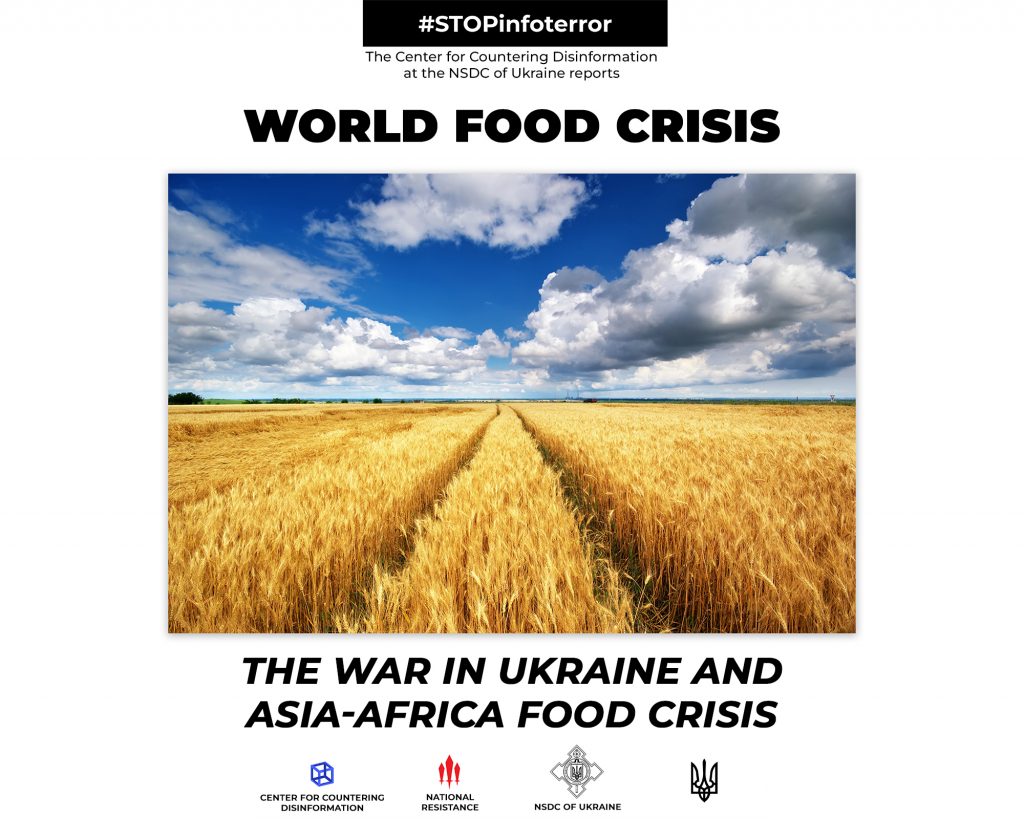FAMINE PROBABILITY IN ASIA AND AFRICA DUE TO THE WAR IN UKRAINE
The Center for Combating Disinformation at the National Security and Defense Council of Ukraine analyzed how the war in Ukraine will affect the food situation in Asia.
Before the war started, Ukraine had almost 3,000 kilometers of the sea coast, with 18 ports located there, 5 of which are in the annexed Crimea. Half of the total volume of Ukraine’s international trade was carried throughout them, and 60% of domestic goods were exported from there as well. russia’s military aggression resulted in navigation freedom violation and caused significant losses to the Ukrainian economy.
On the eve of the war, experts assessed the economic risks of a complete russian blockade of the Ukrainian coast. The state’s daily losses in the event of a week-long stoppage of the ports were estimated at $40 million.
Even though the war prevents farmers from sowing, destroys fuel stocks, blocks ports and exports of existing grain, disrupts traditional logistics chains, and causes price increase for basic food, though Ukraine remains fully supplied with food for the domestic market.
Previously, Ukraine and the russian federation produced one-third of the world’s wheat and barley, one-fifth of corn, and more than a half of sunflower oil. Ukraine provided two-thirds of the world’s sunflower oil exports. Because of the war, world food prices increased to the maximum: wheat increased by 19.7%, corn by 19.1%, vegetable oils by 23.2%, sugar by 6.7%, and meat by 4.8%.
The suspension of wheat, corn, and barley supply affects the food security of Syria, Morocco, Lebanon, Algeria, Jordan, Egypt, Libya, and Yemen.
Grain, flour, and bread are essential components of Asian cuisine and people’s daily diet. In many countries of the Middle East, the price of bread and other basic products such as oil, flour, and rice is fixed or subsidized. The stability of states depends on this.
That is why it is not surprising that the food security crisis in the Middle Eastern region affects the formation of the political position of states regarding the russian invasion of Ukraine.
Turkey currently pays $347 for wheat imports, compared to $297 at the end of 2021 and $230 in 2020. In Egypt (population – 106 million), own wheat cultivation provides less than 50% of the country’s needs. In past years, 85% of grain was imported from the russian federation and Ukraine. That is why the price per ton of flour has risen to $700, and non-subsidized bread prices have risen by 50%.
Flour, vegetables, chicken, and sugar prices in Palestine have increased significantly. Palestine imports 95% of its wheat but has no infrastructure to store food. As a result, stocks of flour can be exhausted within three weeks.
Israel imports half of its grain and groats from Ukraine. The leaders of Israel and Jordan are considering the possibility of creating joint regional storage of food and wheat.
There is an acute political crisis In Tunisia due to the constitutional coup on July 25th last year. Therefore, they are now looking for alternative supply sources to cover the shortage and stop the rising prices.
Rising prices in poorer Lebanon and Yemen will put food out of reach for the poor. In Iraq, current stocks of wheat do not exceed three months.
Lebanon used to import 96% of its flour from Ukraine and russia. From the first days of the war, a bread crisis began in the country, the prices of bread in Lebanon increased by 20%, and stores rationed the number of sales of their products. Ukraine used to provide 66% of imported supplies. The Lebanese have no grain reserves of their own. Therefore, Lebanon is interested in ending the war in Ukraine as soon as possible since it is worsening their situation every day.
It is especially difficult for Algeria. Due to insufficient rainfall last year, the volume of its harvest was 40% lower than usual. The war in Ukraine exacerbated the problem. Also, Algeria imports 11% of European oil and gas. The redistribution of the oil and gas market as a result of the war gives Algeria a chance to get rich and get out of the crisis of recent years.
In addition, Algeria imports 75% of its weapons from russia but also cooperates with NATO and the EU.
In the dispute over Western Sahara, the USA is on the side of Morocco, and the russians support Algeria. Thus, Algeria is inclined to partner with China, russia, and Turkey. Therefore, its position on the war in Ukraine is restrained and neutral.
Food pressure on Asia can create a migration crisis in the EU, adding to the existing instability due to russia’s war in Ukraine.










